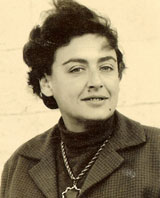Janina Bauman
 Janina Bauman, in the words of one of many friends, was "a truly beautiful person, who made things golden" Yet her serene demeanour and dreamy, thoughtful disposition, belied the turbulence of her early life as witness to the horrors of the Warsaw ghetto and post-war anti-Semitic purges in socialist Poland. Her testament to the times and to the enduring human spirit, came in the form of two autobiographical volumes: Winter in the Morning (Virago 1986), based on diaries kept as a young girl during the war, and A Dream of Belonging (Virago, 1988) (republished jointly as "Beyond These Walls", Virago 2009).
Janina Bauman, in the words of one of many friends, was "a truly beautiful person, who made things golden" Yet her serene demeanour and dreamy, thoughtful disposition, belied the turbulence of her early life as witness to the horrors of the Warsaw ghetto and post-war anti-Semitic purges in socialist Poland. Her testament to the times and to the enduring human spirit, came in the form of two autobiographical volumes: Winter in the Morning (Virago 1986), based on diaries kept as a young girl during the war, and A Dream of Belonging (Virago, 1988) (republished jointly as "Beyond These Walls", Virago 2009).
She was born in Warsaw in 1926 into an assimilated ,educated, well off Jewish family of doctors. Hitler's invasion of Poland in September 1939 put an end to an idyllic childhood and saw Janina, her sister, Zosia, and their mother incarcerated in the Warsaw Ghetto, and later, following their escape, beyond its walls. It was when hiding in the house of a peasant woman in the Polish countryside, that she learned of the death of her father, then an Army Officer, in the massacre at the forest of Katyn in Russia, from a list in a newspaper spread on the kitchen floor, over which she was peeling potatoes.
Dreaming of 'belonging', after enforced wartime idleness, Janina she was for a brief moment seduced by the ideals of Zionism, later threw herself with youthful zeal into the task of building of socialist Poland. In March 1948, while studying journalism at the Warsaw Academy of Social Sciences, she met and found her soul-mate in a 'handsome army captain', intellectual and committed communist, Zygmunt Bauman, whose proposal of marriage she accepted 9 days later. She was to become his undisputed muse for the next 62 years.Together, they raised a family and pursued their careers – Janina rapidly advancing in the Polish Film industry, Bauman as lecturer in Sociology at Warsaw University. Disillusionment with communism following the denouncement of Stalin by Kruschev in1956, and pressures of antisemitic persecution, compelled the Baumans to leave Poland for Israel in 1968, three years later settling in Leeds, where Zygmunt took on the Chair of Sociology. It was there that Janina turned to writing, her moving testimonies characteristically un-judgemental and free of bitterness.
